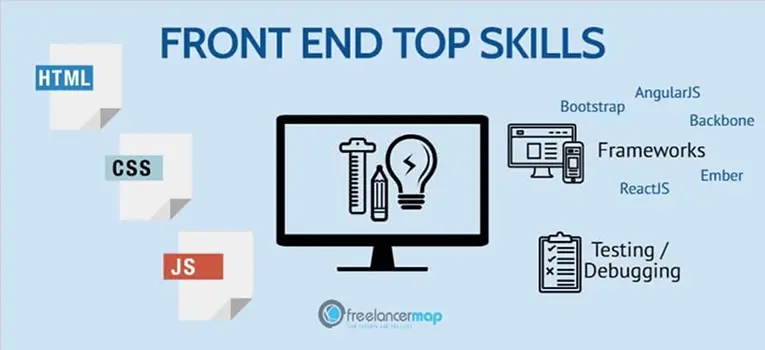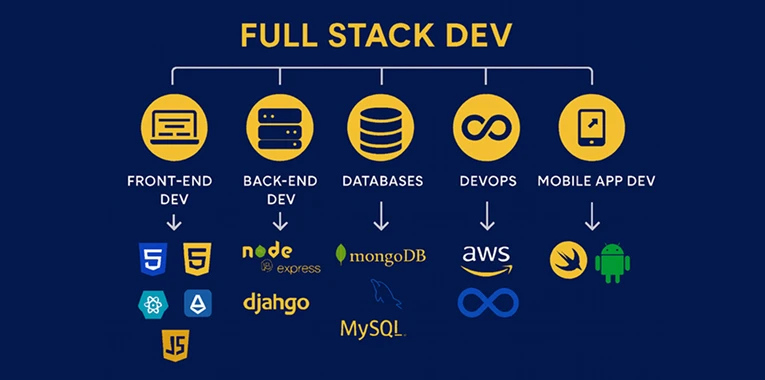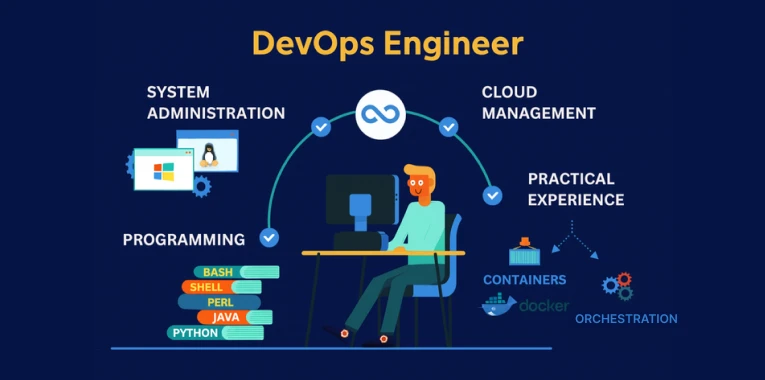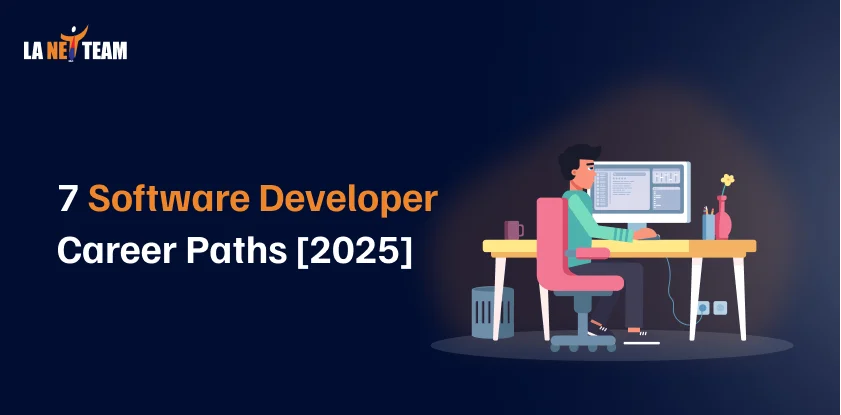Have you ever thought about who creates the apps you use, the games you play, or the websites you visit?
It’s a software developer…. But the truth is, not every developer does the same job.
Some focus on the design you see, others work on what you don’t see (the systems and logic), and many specialize in between.
That’s what makes this field exciting… but also a bit confusing when you’re choosing a software developer career path. There are multiple paths, each with its own pros, cons, and opportunities.
Therefore, in this guide, we have broken down the 7 most demanding software developer career paths in 2025, so that at the end of the blog, you can surely figure out which path feels right for you.
Quick Answer: 7 Main Software Developer Career Paths
- Front-end development: The construction of what the users see and touch. (Salary: $75K-$180K)
- Back-end development: This is the place where the software in the background is developed. (Salary: $80K-$190K)
- Full-stack Development: Doing both front-end and back-end work. (Salary: $85K-$200K)
- DevOps Engineering: The control of systems and tools used to help developers be faster. (Salary: $90K-$210K)
- Engineering Management: chaired teams of developers. (Salary: $140K-$250K)
- Software Architecture: This is the design of the architecture of software systems. (Salary: $150K-$250k)
- Freelance Development: It involves a person working on their own, with the ability to select projects. (Salary: $75-$250 per hour)
Organizations failing to provide explicit career advancement lose four out of five tech workers in just two years. Companies that invest in career development retain employees and produce products more quickly.
Being aware of them helps you plan your career path better, whether you want to how to start a career in coding, grow in your current job, lead a team, or start your own projects.
What is a Software Developer?
A software developer is a person who is skilled at creating computer programs or applications that will enhance the productivity of phones, computers, and businesses.
Developers write directions (codes) in programming languages such as Python, Java, and JavaScript to design various tools that will support their clients and users. Developers also test and debug solutions that address problems correctly.
Software developers, in a technical definition, operate under the auspices of the software development life cycle (SDLC) which consists of planning, coding, testing, and maintenance/updating software. Developers collaborate with designers and testers to create accessible and functional software.
To learn the foundation behind all this, check out What is Software Development, which explains how software is built from idea to final product.
Understanding the Software Developer Career In 2025
Software developers today do more than just writing the code. They help shape the product, bring new ideas, and make customers happy.
The old way of moving straight up from junior to senior to manager is gone. Now, there are many paths you can take, each with different opportunities.
Smart companies find ways to match what developers are good at, what the business needs, and what will be important in the future. This helps both the developer and the company succeed.
Losing a senior developer is very costly and can take many months to replace. Companies that plan career paths well keep their employees longer and build better products faster.
Is Software Developer a good career option?

Yes, software developer is a good choice of career in 2025. The software developer demand is high and increasing rapidly with approximately 17 percent growth per decade in the USA.
Software developers make great money. Entry-level roles’ salaries typically start at around $70,000 per year, and with experience, they can increase to over $ 130,000.
Most importantly, perks, including flexible work hours, working remotely, and a variety of learning and growth opportunities, are also provided to many companies on top of it.
👉If you want to grow your skills, read our blog ‘Software development certifications’.
Though new technologies such as AI are altering the way developers are doing their jobs, the demand will not disappear as long as software developers keep learning and developing their skills.
7 Software Developer Career Paths You Should Know
So are you thinking about becoming a software developer in 2025……
But stuck wondering which path is right for you?
Let’s discover those career paths you can choose:
1. Front-End Developer:

The front-end developers develop what the user can see and can click on the sites and apps.
By using languages like HTML, CSS, and JavaScript, React, Vue.js and Angular they build buttons, menus, and pages. They would be keen on developing easy-to-use and visually attractive programs.
Salary Expectations (2025 Market Data):
- Entry-level: $75,000-$95,000
- Mid-level: $105,000-$135,000
- Senior positions: $140,000-$180,000
- Know micro-frontends or WebAssembly? Add 20% to those numbers
Why choose this career?
- You enjoy design and making things look good.
- You like working closely with user experience and building interactive tools.
Pros
- Creative work
- High demand for good UI designers
- Visible impact on users’ experiences
Cons
- Can require juggling design and technical skills
- Browser compatibility issues can be tricky
To learn the languages that front-end developers use most, check out Best Programming Languages for Beginners, a perfect starting point for coding.
2. Back-end developer
The back-end developers develop the ‘behind-the-scenes’ parts of the software. They write code that connects with servers, databases, and APIs written in Java, Python, PHP, ASP.NET, Ruby on Rails, Node.js, Django, MongoDB, and MySQL. They are concerned with speed and security, and data safety.
Salary Expectations: $80,000 to $130,000 per year
Why choose this career?
- If you enjoy solving data and performance problems.
- If you like working on the technical, behind-the-scenes parts of software.
Pros
- Deep technical challenges
- Work with core application logic
- Strong demand and good pay
Cons
- Less visible work (not user-facing)
- Can be complex debugging and optimization tasks
3. Full-stack Developer

Full-stack developers work on both the front end and back end. With their broad skill set, they can build complete, end-to-end applications.
Salary Expectations: $90,000 to $140,000 per year
Why choose this career?
- You like variety and flexibility.
- You want to understand both the technical and design sides.
Pros
- Versatile skills are highly prized
- Opportunities at startups and small companies
- End-to-end project ownership
Cons
- Requires learning many technologies
- It can be demanding to stay current on all fronts
4. Mobile developer
Mobile developers create apps for smartphones and tablets. Code based on Android, Kotlin and Java, iOS, Swift, and cross-platform apps based on Flutter or React Native are some of the technologies and frameworks they use to write code.
Mobile developers work in conjunction with designers and other developers to create applications that are simple to use and do not involve excessive hassles. They also check the applications, correct the bugs, and add more features in such a way that the application continues to run.
Salary Expectations: $85,000 to $135,000 per year
Why choose this career?
- You enjoy creating apps people use on the go.
- You want to build software optimized for mobile devices.
Pros
- Work on popular consumer and business apps
- Growing demand for a mobile solution
- Use device-specific features like GPS, camera
Cons
- Must keep up with frequent OS updates
- App store policies and complexity
5. DevOps Engineer

DevOps experts associate IT operations and software development. They automate the release of software testing, deployment, and system monitoring to release software faster and rely on it. Their tools are Docker, Kubernetes, and AWS.
Salary Expectations: $95,000 to $150,000 per year
Why choose this career?
- If you are interested in improving workflows and system reliability.
- If you enjoy working with cloud computing and automation.
Pros
- High salary
- Key role in modern software delivery
- Collaborate with many teams
Cons
- Can involve on-call duties
- Requires knowledge of both development and operations
6. Freelance Development
Freelance development is a profession in which people work on a project-to-project basis, providing their programming or development skills to different clients. This route is flexible in schedules, in the selection of clients and projects, and in the rate and workload. It is a good choice because freelancers can control their business activity, and they appreciate freedom and being able to define their own career in a distant and global market.
Salary Expectations: $111,000 per year on average.
Why choose this career?
- Work on projects you enjoy, from anywhere in the world.
- Control your income and work hours.
- Gain a wide variety of skills by working on different projects.
Pros
- Flexibility to work when and where you want.
- Potential to earn more than regular jobs.
- Opportunities to learn and grow by handling all aspects of a project.
Cons
- No guarantee income
- Work may feel less creative
7. Security Engineering

Application security engineers are experts who protect software from hackers and keep data safe. As per IBM, a single data breach can cost a company around $4.88 million. Because their work is so important, these engineers earn good pay and respect.
They start by finding weak spots in software and teaching others how to write safer code. Senior security engineers make 20-30% more than regular engineers because companies need to avoid costly security mistakes.
Salary Expectations: $140,000 to $180,000 per year
Why choose this career?
- You are critical in defending businesses against expensive cyber-attacks.
- It is a rapidly expanding sector that is in demand and well remunerated.
- You use modern technologies and contribute to the safety of the digital world.
Pros
- High salaries and job security
- Work that makes a real difference in protecting data.
- Opportunities to learn advanced security skills and grow your career.
Cons
- Requires continuous learning due to evolving methods and tools.
- The job can be stressful because mistakes can cause big problems.
Future-Proofing Your Software Development Career
Emerging Technologies and Opportunities
The tech world is changing fast, here are some important trends for 2025:
AI and Machine Learning: Knowing how to use AI makes you much more valuable, it’s no longer optional.
Edge Computing: Processing data closer to where it happens is becoming huge. Learning this early will be a big advantage.
Quantum Computing: This is brand new, but once it becomes mainstream, it will transform all things. You have a head start now.
Low-Code/No-Code Platforms: This type of platform is not supposed to substitute a developer, but rather it gives you the ability to work on a more challenging problem.
Adapting to Industry Changes
In order to lead a long and successful career, you must be flexible and willing to learn:
Embrace Change: The new tech could be used to displace old jobs and is creating new ones. E.g. when an old tool is lost, study the new.
Learn How to Learn: Learn about problem-solving skills that are compatible with any technology.
Be Strong and Ready: Have many skills and income sources so you don’t rely on just one.
What is the Best Career Path for a Software Developer?
There is no best career path for software developers. The perfect path depends on what a person likes and their dreams for the future. Some popular jobs pay more and are in high demand, such as:
- Data engineer
- Cloud Engineer
- Cyber security
If someone enjoys being the boss, they also become a project manager or Solution Architect, leading teams and coming up with big ideas.
For more guidance, check out : Software Development vs Software Engineering to understand the difference between roles and expectations.
Closure
The world of software developer career paths is wide and full of opportunities in 2025. And the reality is, not a single one of the many software developer career paths is perfect.
The important thing is that you decide for yourself the path with your own personal goals and interests and devote your whole life to its development.
It is important to remember that career excellence does not occur suddenly. They are based on deliberate studies, wise decisions and innovative work.
